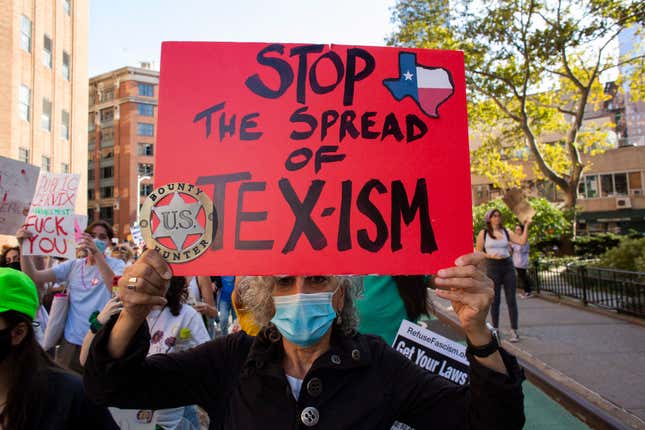Why Is Texas Getting a Pass For Its Crazy Abortion Law?
The corporate response to S.B. has been largely ad hoc and ineffective.
AbortionPolitics

When Billie Eilish performed to a sold-out crowd at Austin City Limits at the beginning of October, she told the crowd she almost didn’t come to the Texas capitol — and S.B. 8, the six-week abortion ban, was to blame. “When they made that shit a law, I almost didn’t want to do the show, because I wanted to punish this fucking place for allowing that to happen here… My body, my fucking choice!” Eilish yelled at the crowd, holding up her middle finger for emphasis.
The massive screens behind her proclaimed “BANS OFF OUR BODIES.” She posted that middle-finger moment to Instagram and raked in more than 2 million likes.
Houston’s own Megan Thee Stallion also railed against S.B. 8 and the legislators who passed it in an Instagram post and during her own set: “This middle finger is also to these motherfucking men that want to tell us what the fuck to do with our body,” she told the ACL crowd. “Cuz how the fuck you gonna tell me what to do with my motherfucking body?”
S.B. 8 — a law that outlaws abortion after six weeks with no exceptions for rape or incest and unclear medical exemptions — was largely ignored by national media as it wound its way through the Texas legislature. While courts have legally laughed at most abortion bans that early in gestation, S.B. 8 got creative with its enforcement by letting private civil actions (including a $10,000 bounty) police the choices of Texans. It went into effect at midnight on Sept. 1, with the Supreme Court declining to issue an injunction because of the “complex and novel” questions at hand.
-

-

-

-

-

-

-

-

-

-

-

-

-

-

-

-

-

-

-

-

-

-

-

-

-

-

-

-

-

-

-

-

-

-

-

-

-

-

-

-








































